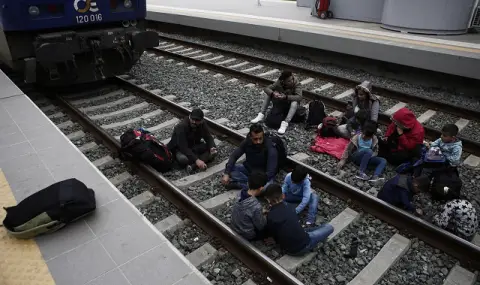Germany has experienced a political earthquake. Friedrich Merz lost a key vote in the Bundestag, which was supposed to limit the flow of migrants to Germany. Is this not a harbinger of another - bigger - loss?
The consequences of the disputed vote could change the balance of power in Germany's future parliament, which will be elected on February 23 of this year. The German media is calling the last few days historic. One thing is certain: the issue of limiting migration has come to the forefront of the election campaign, leaving even the issue of the economic crisis behind. How did this happen?
How Merz lost a crucial vote
On Friday, the frontrunner for the chancellorship, the leader of the opposition CDU, Friedrich Merz, suffered a huge political defeat in the Bundestag. His bill to restrict migration was rejected. Support from the right-wing populist Alternative for Germany (AfD) proved insufficient, as not all members of Merz's Christian Democratic Union (CDU) voted "yes". The same applies to some members of the liberal FDP. Despite three hours of debate, no agreement could be reached on amending the bill in question.
It was introduced following a series of attacks by migrants that resulted in deaths. The latest tragic incident was in the Bavarian town of Aschaffenburg, where a two-year-old child and a passerby who tried to protect him were killed by a migrant from Afghanistan. Chancellor candidate Friedrich Merz, whose party has been campaigning for years to limit migration, decided to play "vabank" this time, but lost.
First, the CDU/CSU put a proposal to the vote to impose permanent border controls and stop the admission of refugees at the borders. This initiative, which was not legally binding, was approved on Wednesday, with the votes of both the FDP and the right-wing populist "Alternative for Germany", parts of which are proven to be far-right. This is the first time something like this has happened in Germany. The joint vote of the CDU/CSU with the right-wing populists of the AfD has sparked protests across the country.
Merkel vs. Merz
Even former German Chancellor Angela Merkel publicly and unusually categorically declared that Merz was making a mistake - a fact that surprised many observers, since Merkel steadfastly avoids taking a position on issues of current politics in Germany. Merkel and Merz were in conflict for power in the party, the two had disagreements on various political issues, including the issue of migration.
In protest against the vote of the Christian Democrats with the AfD, the popular TV presenter Michel Friedmann renounced his membership in the CDU, and the Holocaust survivor Albrecht Weinberg announced that he was returning the Order of Merit with which he was awarded by the Federal Republic. Hundreds of artists, actors and musicians have written an open letter against Merz's migration proposals, and tens of thousands of German citizens have taken to the streets to protest against the CDU initiative. More mass rallies are expected, the largest of which will be held in Berlin today. Critics accuse Merz of breaking his own word. In November, the CDU leader told the Bundestag that there would be no cooperation with the "Alternative for Germany". Chancellor Olaf Scholz has also criticized Friedrich Merz. Scholz claims that the CDU leader did not want to have a discussion about the controversial bill that could lead to a possible compromise.
What party is the "Alternative for Germany"?
Founded in 2013, the "Alternative for Germany" has transformed from a Eurosceptic into a far-right party, partly recognized as right-wing extremist. Its main theme is the radical restriction of migration. There is also talk of mass deportations and "remigration". The party has particularly strong positions in East Germany, in the former GDR. In the recent state elections in Thuringia, it came in first place. In this federal state, the "Alternative for Germany" has a particularly strong right-wing extremist wing, and the head of the AfD faction in Thuringia, Björn Höcke, has been declared by the court to be publicly called a fascist.
In foreign policy, the AfD supports Germany's exit from the European Union and its restoration as a purely economic union. He also calls for an end to arms supplies to Ukraine and for the lifting of economic sanctions against Russia imposed for its military invasion of Ukraine.
What is Merz accused of
When Merz took over as head of the CDU, he promised to halve the number of AfD supporters in Germany. So far, he has achieved the exact opposite. Compared to the 2021 Bundestag elections, the “Alternative for Germany” has doubled its popularity. It is now in second place in opinion polls after the CDU/CSU, with a rating of 21 to 23%, with the gap with the conservatives narrowing. Observers believe that by voting in the Bundestag to limit migration, Merz wanted to take away an important issue from the AfD, but so far he has succeeded in giving a new impetus to the political left.
The main thing that political opponents and critics accuse Merz of is breaking the unspoken taboo on voting together with the AfD in the Bundestag, which could “normalize” cooperation with the far-right party. At the provincial level, such votes have already taken place. Some time ago in Thuringia, a member of the FDP was elected prime minister with the votes of the CDU and AfD. At the time, this led to a scandal, personal intervention by Angela Merkel, and changes in some leadership positions in the CDU. How the current events will affect Merz's rating and the opposition CDU/CSU, as well as the AfD, remains to be seen - including in the elections on February 23.
